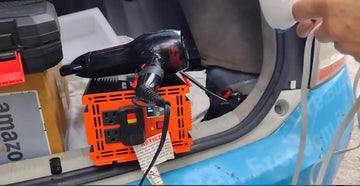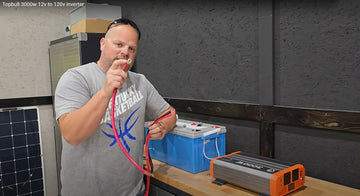Batteries have always been an important source of power to propel golf carts around the course. For a long time, deep-cycle, liquid-rich lead-acid batteries were considered the most cost-effective option for powering electric golf carts. However, with the advent of lithium battery technology in high power applications, an in-depth study of the potential benefits of LiFePO4 batteries in golf carts has begun. Lead acid or lithium…what’s the best golf cart battery? We will provide informative comparisons and discuss the benefits of lithium batteries.
Reasons to choose lithium batteries
Briefly, the advantages of lithium batteries are as follows
- High energy density: Lithium batteries can store more energy in the same volume or weight, giving golf carts a longer range. Lithium is leak proof for safer storage.
- Fast charging: Lithium batteries have fast charge capability, 4 times faster than traditional lead-acid batteries, saving waiting time.
- Longer life: Lithium batteries typically have a longer life and cycle life, reducing the frequency of battery changes and maintenance costs.
- Lithium batteries are smart: Lithium batteries allow you to check battery status via Bluetooth.
- Save weight: Lithium batteries are typically lighter and can reduce the overall weight of your golf cart, helping to improve your vehicle's handling and stability.
- Environmentally friendly: Lithium batteries are relatively more environmentally friendly, free of heavy metals and hazardous substances, which can reduce the impact on the environment.

Lithium battery lifetime
Lithium batteries typically have a longer cycle life than conventional lead-acid batteries. The cycle life of lithium batteries is 10 times longer than that of lead-acid batteries. Lead-acid batteries have a life of approximately 300 to 500 charge cycles, whereas lithium batteries have a life of 2,000 to 5,000 charge cycles.
Although lithium batteries have a high initial cost, they can pay for themselves in a relatively short period of time over their useful life due to their longer life and higher number of cycles. Not only does the investment in lithium batteries pay for itself over time, but there are also significant savings to be made through reduced energy bills, maintenance costs and repairs that may be required on heavy duty lead acid golf carts. They also perform better overall!
Faster charging with lithium batteries
Time management is critical in the game of golf. Whether you choose lead-acid or lithium batteries, they need to be recharged regularly. Charging is an essential process and unless you happen to have a spare cart available, charging time can temporarily interrupt your round. A good golf cart needs to maintain consistent power and speed over any course terrain. Lithium batteries can do this easily, but lead-acid batteries can slow down a cart as the voltage drops. In addition, it takes around eight hours to fully recharge a standard lead-acid battery after it has been depleted. Lithium-ion batteries, on the other hand, can be charged to 80% in about an hour and fully charged in two hours.
In addition, partially charged lead-acid batteries can suffer sulphate damage, which can significantly reduce battery life. Lithium batteries, on the other hand, do not react adversely when not fully charged, so it is possible to charge a golf cart briefly at lunchtime.
Lightweight design for lithium batteries
Installing lithium batteries in golf carts can significantly improve the weight to power ratio of the cart, making it easier to travel uphill or over difficult terrain. Golfers are always looking for ways to optimise their performance on the course and the weight of their equipment is a key consideration. Lithium batteries are much lighter than lead-acid batteries, resulting in a more balanced and manoeuvrable golf cart. Lithium batteries are half the weight of traditional lead-acid batteries, which is two-thirds the weight of batteries typically used in golf carts.
Less weight means golf carts can reach higher speeds with less effort and carry more weight without slowing down passengers. The reduced weight not only improves the cart's agility, but also helps to protect the turf by reducing pressure on the delicate grass, ensuring a smoother, more enjoyable golfing experience for players and groundskeepers alike. Golf carts won't tear up the grass and there is less pressure on the brakes. Not only will your customers be able to brake in shorter distances, but they won't have to replace brakes and other mechanical parts as often.
Lighter batteries mean more carrying capacity
Due to their lighter weight, lithium-ion golf cart batteries can significantly increase the speed and carrying capacity of the product. Because of the high weight to power ratio of lithium batteries, lithium-ion golf carts can carry two additional average-sized adults and their equipment before reaching capacity. Unlike lead-acid batteries and vacuum Unlike lead-acid batteries and suction batteries, lithium batteries maintain the same voltage output regardless of battery charge, which means the golf cart will continue to operate even if the battery pack is dead.
In contrast, lead-acid and AGM batteries can lose voltage output and performance after 75 per cent of the battery's rated capacity has been used, negatively impacting the load capacity and worsening the problem over time. As a result, the use of lithium-ion batteries in golf carts not only increases speed and carrying capacity, but also provides a more reliable power supply, ensuring that the cart can continue to operate efficiently when needed without the impact of degraded battery performance.
Consistent Performance
One of the main advantages of lithium batteries is that they require no golf cart battery maintenance at all, whereas lead-acid batteries require regular inspection and maintenance. Unlike lead-acid batteries, whose voltage drops as they are discharged, lithium batteries provide a steady voltage output until they are almost completely discharged. This consistent power output ensures that golf carts run smoothly and reliably, even during long rounds or on hilly terrain, allowing golfers to concentrate on their game without the distraction of fluctuating battery power. This ultimately saves man-hours and the additional cost of maintaining tools and products. The absence of lead-acid batteries means that chemical spills are avoided and the potential for golf cart downtime is greatly reduced.
In addition, lithium golf cart batteries have built-in low-voltage protection and the battery's circuit board protects your lithium-ion batteries from battery damage, even if you forget to charge the battery and it is completely discharged.
Environmentally friendly
Lithium batteries are less harmful to the environment. They take much less time to fully charge and therefore use less energy, and they contain no harmful substances. Lead-acid batteries, as the name suggests, contain lead, which is harmful to the environment. In addition, lithium batteries are recyclable, further reducing their environmental impact and supporting the move towards greener golf course management!
How much do Lithium batteries cost to buy?
The best golf cart battery for you is ultimately the one that will save you time, money and reduce the weight of your cart. You already know that a lithium battery can save you time on charging and maintenance. It can also save a lot of unwanted weight. But what about money?
As mentioned above, lead-acid batteries may have a lower initial cost. But in the long run, lithium golf carts can save you money:
- Lithium batteries have a lifespan of up to 5,000 cycles, whereas lead-acid batteries only have a lifespan of 500-1,000 cycles, which means that lead-acid batteries have to be replaced much more frequently. So lithium batteries really do pay for themselves in the long run.
- In golf carts, lithium batteries not only reduce the cost of ownership, they also last for the life of the cart. This means that the residual value of a golf cart rental is higher because the batteries do not need to be replaced as often, saving on maintenance costs.
- Because lithium batteries are lighter, lithium golf carts cause less damage to the course and your property. This helps to reduce potential losses and repair costs.
Our lithium-ion golf cart batteries have a cycle life of over 4,000 cycles, significantly reducing your replacement costs and total cost of ownership. In comparison, the 36V 105Ah lithium-ion battery is 50% lighter than a lead-acid golf cart battery of the same capacity, making installation easier. No complicated wiring is required, making it easy to transport and install in golf carts where space is limited. This high performance battery is not only affordable, but will provide significant savings and convenience over the long term.


















